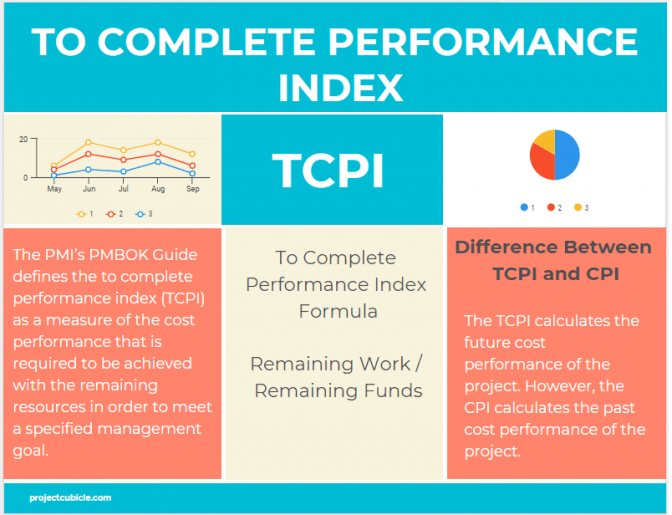There are many tools, techniques and formulas used to forecast the cost performance of a project. To Complete Performance Index (TCPI) is another strong forecasting tool of Earned Value Management (EVM). The PMI’s PMBOK Guide defines the to complete TCPI as a measure of the cost performance that is required to be achieved with the remaining resources in order to meet a specified management goal. Therefore it is the ratio of the cost to finish the outstanding work to the remaining budget. Simply we can say that the To Complete Performance Index (TCPI) is an estimate of future cost efficiency of the project. In this article, we will analyze real-life To Complete Performance Index examples.
Table of Contents
What is the difference between Cost Performance Index (CPI) and To Complete Performance Index (TCPI) ?
To Complete Performance Index (TCPI) is a new term for project management teams. Therefore many PMP aspirants find it difficult to understand. Sometimes project managers mix up the Cost Performance Index (CPI) with the To Complete Performance Index (TCPI) and think that they are identical. However, they are different concepts.
– Cost Performance Index (CPI) measures the current cost efficiency.
– To Complete Performance Index (TCPI) measures the future cost efficiency.
Also, we can say that CPI is the actual performance of the completed work but TCPI is the estimated performance of the remaining work.
The To Complete Performance Index (TCPI) is the result of remaining work over remaining funds.
To Complete Performance Index Formula
TCPI = (Remaining Work) / (Remaining Funds)
Remaining work is the subtraction of the earned value from the total budget.
For calculating the remaining funds, there are two cases.
Case 1: Project is Under Budget
Formula of Case 1: TCPI = (BAC – EV) / (BAC – AC)
When the project is under budget, the remaining funds will be calculated by subtracting the Actual Cost (AC) from the Budget At Completion (BAC).
Case 2: Project is Over Budget
Formula of Case 2: TCPI = (BAC – EV) / (EAC – AC)
When the project is over budget, the remaining funds will be calculated by subtracting the Actual Cost (AC) from the Estimate at Completion (EAC).
For better understanding, let’s taka a look at below to complete performance index examples.
To Complete Performance Index Examples
Example for Case 1
We have a project to be completed in 30 months and the Budget At Completion(BAC) of the project is 90,000,000 USD. 10 months have passed and 33,000,000 USD has been spent, and 40% of the work has been completed.
Now we will calculate the TCPI of the project.
Actual Cost (AC) = 33,000,000 USD
Budget at Completion (BAC) = 90,000,000USD
Planned Value (PV) = (10/30) x 90,000,000 =30,000,000 USD
Earned Value (EV) = %40* 90,000,000 =36,000,000 USD
Cost Performance Index (CPI) = 36,000,000/ 33,000,000 = 1,09
Cost Performance Index (CPI) is 1,09 > 1 so we are under budget and we will use the formula of Case 1
Formula of Case 1: TCPI = (BAC – EV) / (BAC – AC)
TCPI = (90,000,000 – 36,000,000) / (90,000,000 – 33,000,000) = 0,947
This shows that if we can progress with a Cost Performance Index of 0.947, our project will be completed on budget.
Example for Case 2
We have a project to be completed in 30 months and the Budget At Completion(BAC) of the project is 90,000,000 USD. 10 months have passed and 42,000,000 USD has been spent, and 40% of the work has been completed.
Now we will calculate the TCPI of the project.
Actual Cost (AC) = 42,000,000 USD
Budget at Completion (BAC) = 90,000,000USD
Planned Value (PV) = (10/30) x 90,000,000 =30,000,000 USD
Earned Value (EV) = %40* 90,000,000 =36,000,000 USD
Cost Performance Index (CPI) = 36,000,000/ 42,000,000 = 0,857
Estimate at Completion (EAC) = BAC / CPI = 90,000,000 / 0,857 = 105,017,502 USD
Cost Performance Index (CPI) is 0,857< 1 so we are over budget and we will use the formula of Case 2
Formula of Case 2: TCPI = (BAC – EV) / (EAC – AC)
TCPI = (90,000,000 – 36,000,000) / (105,017,502 – 42,000,000) = 0,857
Why To Complete Performance Index (TCPI) is not greater than one ?
As shown in the example for Case 2, we are expecting that in order to complete the project on budget, TCPI must be greater than one. But is this approach correct? Lets analyze.
If we will complete this project on budget, in the formula, EAC must be the same as BAC.
TCPI = (BAC – EV) / (BAC – AC)
TCPI = (90,000,000 – 36,000,000) / (90,000,000 – 42,000,000) = 1,125
This shows that if we can progress with a Cost Performance Index of 1,125 our project will be completed on budget. But it is not realistic that we can complete our project on budget so our EAC (105,017,502) value will be our new approved budget.
TCPI = (90,000,000 – 36,000,000) / (105,017,502 – 42,000,000) = 0,857
Because of the increased EAC, TCPI is less than one.
The Key Points
- The TCPI calculates the future cost performance of the project. However, the CPI calculates the past cost performance of the project.
- You can calculate the TCPI by depending on your project’s current cost performance.
- When you are under budget, you will calculate the remaining funds by subtracting the Actual Cost (AC) from the Budget At Completion (BAC).
- When you are over budget, you will calculate the remaining funds by subtracting the Actual Cost (AC) from the Estimate at Completion (EAC).
- If the TCPI is less than one, your project’ s cost performance is good.
- TCPI is greater than one, you must improve the cost performance of your project by performing more tasks with spending less budget.
- TCPI is an input to project cost performance reviews.
Summary
TCPI is a strong and new tool for project management teams. It enables to measure the cost performance of a project by using the value of the remaining work. By using the TCPI, project teams can easily find the future efficiency of their projects. This tool provides metrics to track future cost performance and helps to complete the project within the budget.
Note that this is an important topic for passing the PMP Certification Exam. You may encounter one or more than one questions related to it.
External References

Vice President, İntelligent Design & Consultancy Ltd
Over 12 years of global & rich experience in Portfolio & Program Delivery Management in leading & managing IT Governance, PMO, IT Portfolio/Program, IT Products, IT service delivery management, Budget Management, and more.















